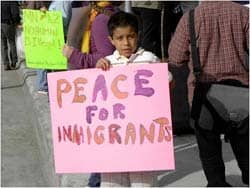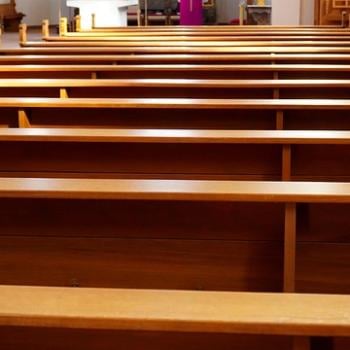By Bruce Epperly
 As a follower of the Path of Jesus, I must take a stand against the recently-enacted Arizona Immigration Law. Often Christians ask, "What would Jesus do?" and while following Jesus doesn't always give us clear public policy directives, in this case, the Gospel is pretty clear: "As you have done unto the least of these, my brothers and sisters, you have done unto me." Jesus is not just mouthing a platitude. Jesus is saying that what we "do" to the vulnerable and marginalized, and to our most intimate friends and persons like ourselves, we are literally "doing" to God. God feels the pain of the outcast, the lost, the lonely, and immigrant, seeking a new life. God feels their hope for a new land and their despair when they are deported to their homelands, often to poverty and persecution.
As a follower of the Path of Jesus, I must take a stand against the recently-enacted Arizona Immigration Law. Often Christians ask, "What would Jesus do?" and while following Jesus doesn't always give us clear public policy directives, in this case, the Gospel is pretty clear: "As you have done unto the least of these, my brothers and sisters, you have done unto me." Jesus is not just mouthing a platitude. Jesus is saying that what we "do" to the vulnerable and marginalized, and to our most intimate friends and persons like ourselves, we are literally "doing" to God. God feels the pain of the outcast, the lost, the lonely, and immigrant, seeking a new life. God feels their hope for a new land and their despair when they are deported to their homelands, often to poverty and persecution.
The immigrant crossing the border is Christ in and among us, and how we respond to her either adds joy or sorrow to God's experience. That's what it means to have a personal relationship to God and for God to have a personal relationship to us. The immigrant, whether documented or undocumented, is a beloved child of God, created by divine wisdom and reflecting the divine image. God hears their prayers, spoken or unspoken, and experiences their hope for a new life.
Now, I recognize the importance of stable governments and the integrity of borders, but I believe that national sovereignty, as important as it is, ranks behind world loyalty and faithfulness to God at least among Christians, and Gov. Jan Brewer as a Christian should know this! Persons come to our land not to break our laws, but to find new life -- to experience a resurrection of the spirit, to provide for their families, and to experience the freedom of choice that we prize as U.S. citizens. All of us are children of wanderers, all of us are God's beloved, and all of us are in need of deep hospitality. Jesus' promise of abundant life also applies to the stranger in our midst. The body of Christ, God's presence in the world, is enriched by diverse gifts and weakened by homogeneity of race, ethnicity, or homeland.
I believe that God is often the source of the quest for freedom and the journey to a new land. As a European American, I celebrate God's movements in lives of the Pilgrim parents, strangers in a strange land. I suspect thousands of years before their arrival, God inspired adventurers on perilous journeys across the Bering Strait to an uncharted land. I celebrate my Scot, English, and German ancestors who made the voyage from Europe to North America. Could God have guided their steps and moved gently through their decisions to leave security in search of a land of promise and adventure for themselves and their loved ones? I have every reason to believe that God, who inspires all creation with new possibilities, has also inspired many of today's documented and undocumented immigrants in their journeys toward freedom and prosperity.
Knowing that God is at work in all of our journeys, what then shall we do as Christians? While I don't assume that I have all the answers and don't presume to dictate public policy entirely on Christian terms, I believe that a compassionate, hospitable, loving, and orderly approach to immigration suggests the following:
- A commitment by the U.S. to promoting in non-hierarchical ways economic and political justice in neighboring lands.
- A willingness to promote the well-being of marginalized people in other lands above corporate profits or political advantage.
- A recognition that our national well-being is connected with the well-being of people in neighboring lands.
- A suspension of any law that promotes racial profiling in Arizona or any other jurisdiction.
- Paths of welcome to immigrants at our borders and those already in our country. This does not mean a porous border, but the recognition that immigrants have always been beneficial to our nation and should be welcomed and documented in ways congruent with national and local security.
- The creation of immigrant hostels in the borderlands: places with adequate shelter, medical care, food, and tasks to perform during a time of legal processing of prospective immigrants.
- Keeping together immigrant families whose children were born in the U.S.
Christians, of course, must choose to do more:
- A commitment to see God's presence not only in our own citizens but also in the faces of immigrants.
- A National Day of Prayer and Confession for our treatment of immigrants and marginalized people.
- Work for a just economic structure in the U.S. and in neighboring lands.
- Confess the moral bankruptcy of placing property, wealth, and individual gain above our obligations to reach out to God's beloved children.
- Expand our sense of community and willingness to share our resources, including our taxes, in ways that benefit vulnerable people in our country.





